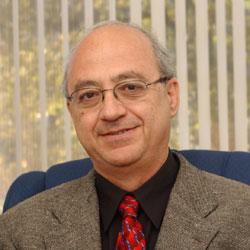| |
| |
| George Kunos, M.D., Ph.D., Senior Investigator |
 |
Dr. Kunos received his M.D. degree in 1966 from Semmelweis University in Budapest and his Ph.D. in 1973 from McGill University in Montreal where he worked with Mark Nickerson on adrenergic receptors. In 1974 he joined the faculty in Pharmacology and Medicine at McGill University and then in 1987 joined the NIAAA as Chief of the Laboratory of Physiologic and Pharmacologic Studies. Dr. Kunos moved to the Medical College of Virginia in 1992 to Chair the Department of Pharmacology & Toxicology. In 2000 he returned to NIH as Scientific Director of NIAAA. He is an elected fellow of the High Blood Pressure Research Council of the American Heart Association and a foreign member of the Hungarian Academy of Sciences. He is recipient of the Mechoulam Award of the Intl. Cannabinoid Research Society and the NIH Director's Award. Dr. Kunos' laboratory is studying the role of endocannabinoids in neuroendocrine, metabolic and cardiovascular regulation.
|

|
Staff:
- Sandor Batkai, M.D., Staff Scientist, (301) 496-6777 sbatkai@mail.nih.gov
- Grzegorz Godlewski, Ph.D., Visiting Fellow, (301) 496-6777 godlewskig@mail.nih.gov
- Judy Harvey-White, B.S., Senior Research Assistant, (301) 496-6777 harveyj@ninds.nih.gov
- Jie Liu, M.D., Staff Scientist jiel@mail.nih.gov
- Bani Mukhopadhyay, Ph.D., Research Fellow, (301) 496-6777 mukhopadhyayb@mail.nih.gov
- Laszlo Offertaler, M.D., Research Fellow offertal@mail.nih.gov
- Douglas Osei-Hyiaman, M.D., Ph.D., Postdoctoral Fellow dhyiaman@willco.niaaa.nih.gov
Research Interests:
Our laboratory focuses on the biology of the endocannabinoid system and its therapeutic implications.
Endocannabinoids are novel lipid mediators that interact with the same receptors that recognize the psychoactive ingredient of marijuana and produce similar biological effects. We have identified a paracrine mechanism whereby endocannabinoids generated in macrophages and platelets act on vascular and cardiac cannabinoid receptors to elicit vasodilation and decreased cardiac contractility. We are exploring the role of this mechanism in the regulation of blood pressure, the factors that activate this pathway, the signaling pathways involved in both the generation and the action of endocannabinoids, and the identity of as-yet-unidentified vascular cannabinoid receptor(s). We use physiological approaches in whole animals, including genetically altered mice, as well as cell and molecular biological techniques.
Cannabinoids increase appetite and our laboratory has provided evidence that endocannabinoids acting at CB1 receptors in the brain are regulated by leptin, are involved in mediating the hunger-induced increase in food intake, and are also involved in the motivation to drink alcohol. Our more recent findings indicate that endocannabinoids also regulate peripheral fat metabolism via CB1 receptors in liver and adipose tissue, and these peripheral effects contribute to diet-related obesity, fatty liver and its hormonal/metabolic consequences. Endocannabinoids acting via hepatic CB1 receptors also play a key role in alcoholic liver disease. We use a combination of behavioral, physico-chemical (mass spectrometry) and immunohistochemical approaches and are also involved in developing novel compounds that target the endocannabinoid system for therapeutic purposes.
|
Selected Recent Publications:
� Osei-Hyiaman D, Liu J, Zhou L, Godlewski G, Harvey-White J, Jeong WI, Batkai S, Marsicano G, Lutz B, Kunos G (InPress) Hepatic CB1 receptor involvement in diet-induced steatosis, altered lipid profile, and insulin and leptin resistance., J. Clin. Invest. .
� Jeong WI, Osei-Hyiaman D, Liu J, Batkai S, Mukhopadhyay P, Horiguchi N, Perk O, Harvey-White J, Marsicano G, Lutz B, Gao B, Kunos G (2008) Paracrine activation of hepatic CB1 receptors by stellate cell-derived endocannabinoids mediate alcoholic fatty liver., Cell Metabolism 7, 227-235.
� Osei-Hyiaman D, Depetrillo M, Pacher P, Liu J, Radaeva S, Batkai S, Harvey-White J, Offertaler L, Wang L, Kunos G (2005) Endocannabinoid acting at hepatic CB1 receptors regulates fatty acid synthesis: role in diet-induced obesity., J. Clin. Invest. 115, 1298-1305.
Wang L, Liu J, Harvey-White J, Zimmer A, Kunos G (2003) Endocannabinoid signaling via CB1 receptors is involved in ethanol preference and its age-dependent decline in mice. , Proc Natl Acad Sci 100, 1393-1398.
Batkai S, Jarai Z, Wagner JA, Goparaju SK, Varga K, Liu J, Wang L, Mirshahi S, Khanolkar AD, Makriyannis A, Urbaschek R, Garcia N, Sanyal AJ, Kunos G (2001) Endocannabinoids acting at vascular CB1 receptors mediate the vasodilated state in advanced liver cirrhosis, Nature Medicine 7, 827-832.
Di Marzo V, Goparaju SK, Wang L, Liu J, Batkai S, Jarai Z, Fezza F, Miura GI, Palmiter RD, Sugiura T, Kunos G (2001) Leptin-regulated endocannabinoids acting at CB1 receptors are involved in maintaining food intake, Nature (London) 410, 822-825.
All Selected Publications
Contact Information:
Dr. George Kunos
Neuroendocrinology Section
Laboratory of Physiologic Studies, NIAAA
5625 Fishers Lane
Rm. 2S24, MSC 9413
Bethesda, MD 20892-9413
Telephone: (301) 443-2069 (office),
(301) 443-2069 (laboratory),
(301) 480-0257 (fax)
Email: gkunos@mail.nih.gov
|
|















